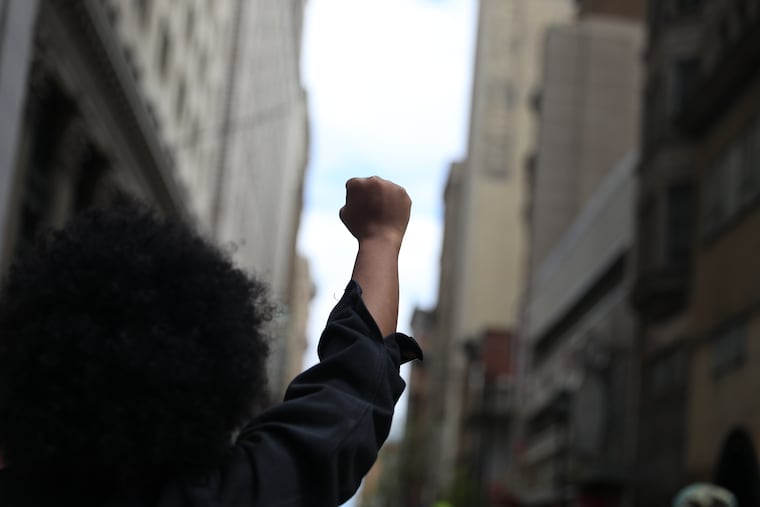Philadelphia deserves anti-racist media | Opinion
It is time for a deep reckoning of our existing media system and the role it often plays in reflecting classist and racist interests that threaten safety for all.

In the last year, organizers and activists, youth and elders in Philadelphia and across the country came together to sustain perhaps the largest mobilization against police violence in U.S. history. Between May 26, 2020, and the end of that June, the country averaged 140 demonstrations a day.
This movement also compelled deeper reflection inside local and national newsrooms about their role in upholding police narratives and their responsibility to challenge systemic racism in their reporting.
A year since the uprisings in response to the police murder of George Floyd, we don’t just need diversity and inclusion initiatives and sensitivity trainings on white privilege in newsrooms. We need an anti-racist media system.
» READ MORE: Inquirer publisher: One year later, reflection and a look ahead
An anti-racist media system means addressing the real dangers that our media system puts on Black, Indigenous, migrants, and communities of color in our city, and no longer shirking the responsibility to answer calls for redress and reparations to historical and ongoing harms.
This requires abolishing harmful narratives that criminalize people experiencing the trauma of poverty stemming from the systemic withholding of resources. It means journalism ending the reinforcement of police-centered solutions to social welfare issues, instead promoting, for example, mental health alternatives to the typical police responses that led to their murder of Walter Wallace Jr. last October.
Anti-racist media is plural and human centered. It is created by and represents the city’s long-standing Black, Indigenous, migrant, and communities of color by addressing the intersection of voices, cultures, and textures of our achievements and issues. It highlights gender and sexual diversity in these communities. It ensures meaningful partnerships in our local media and promotes self-determination through the stories and narratives of everyday Philadelphians.
Anti-racist media challenges the corporate landscape of ownership while supporting workers’ rights and organizing power, particularly crucial for underrepresented journalists of color. It centers transformative justice rooted in community healing and the restoration of humanity so often denied communities of color by mainstream media narratives. It cultivates respect and dignity for all through solidarity and mutual well-being.
» READ MORE: When media rely on what police say, they miss key truths about crime, black communities | Will Bunch
In the last year, the vision of abolition and calls to defund the police gained mainstream attention in headlines, features, and op-eds, prompting a nationwide anti-racist reckoning. In Philly’s own media landscape, a diversity and inclusion audit of The Philadelphia Inquirer published in February of this year found that the paper of record has fallen woefully short on issues of “cultural competency” (recall the reactionary “Buildings Matter, too” headline). An analysis of local coverage of George Floyd protests, published last month from the Reframe project at Resolve Philadelphia, found that headlines prioritized responses to protest over the source of the unrest or protesters’ demands.
While the uprisings dominated the news and changed the national conversation on race and policing, precincts and newsrooms alike remain largely unchanged. Addressing this is not only about biases in editorial policies and sensationalized headlines, for it is deep in the structure of how newsrooms are organized and whose narratives count.
A future that includes anti-racist media begins with acknowledging the long history of bias, discrimination, and structural racism in our media. As the Free Press organization’s recent Media 2070 recounts, newspapers have harmed, traumatized, and brutalized communities of color by spreading myths of racial inferiority and criminality. Juan González and Joseph Torres’ News for All the People carefully documents how for centuries the media were central in fortifying settler colonial and white supremacist projects of Indigenous genocide, facilitating profitable markets of enslaved Africans, encouraging the lynching of Black Americans, fomenting recurring waves of anti-migrant sentiments — all while stoking support for imperial wars abroad.
Thankfully, people are coming together to envision a just media system and work on institutional and community-based change. In the last year, the Shift the Narrative coalition has joined grassroots Philadelphians to hold newsrooms accountable, and tell their own truth and stories that promote community-based solutions that envision public safety beyond the cycles of abusive policing, punitive sentencing, and criminalized reentry.
» READ MORE: A Philly man was cleared of murder after 34 years by evidence that was in the police file all along
This includes challenging routine newsroom reporting practices that play a part in silencing community voices and eliding their experiences and needs in a city that has overpoliced and economically under-resourced much of its Black and Brown communities. It involves pushing newsrooms to meet with community organizations to have honest conversations about coverage on “criminal justice” issues and question single-source reporting that relies on accounts of community affairs offered by police and their spokespersons, when those accounts are often unreliable.
It asks journalists to think about how the language they use undermines the dignity of those reported upon, including a commitment to “human-first” language that avoids dehumanizing descriptions like “felon,” and trauma-informed reporting that acknowledges harm to communities in order to not perpetuate it.
And it challenges concepts of “safety” that assume more policing is the answer when there is no evidence that this keeps communities, especially those of color, safe, while ignoring the structural root of violence.
It is time for a deep reckoning of our existing media system and the role it often plays in reflecting classist and racist interests that threaten safety for all. For racial justice to exist, an anti-racist media system has to matter — and we have to demand it.
Malav Kanuga is a researcher with the Media, Inequality, and Change Center and a cooperative member of Making Worlds Bookstore and Social Center in West Philadelphia.